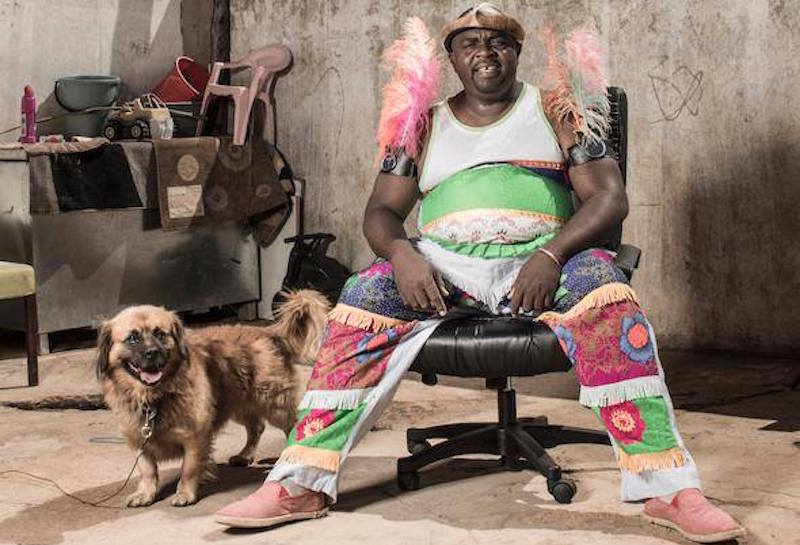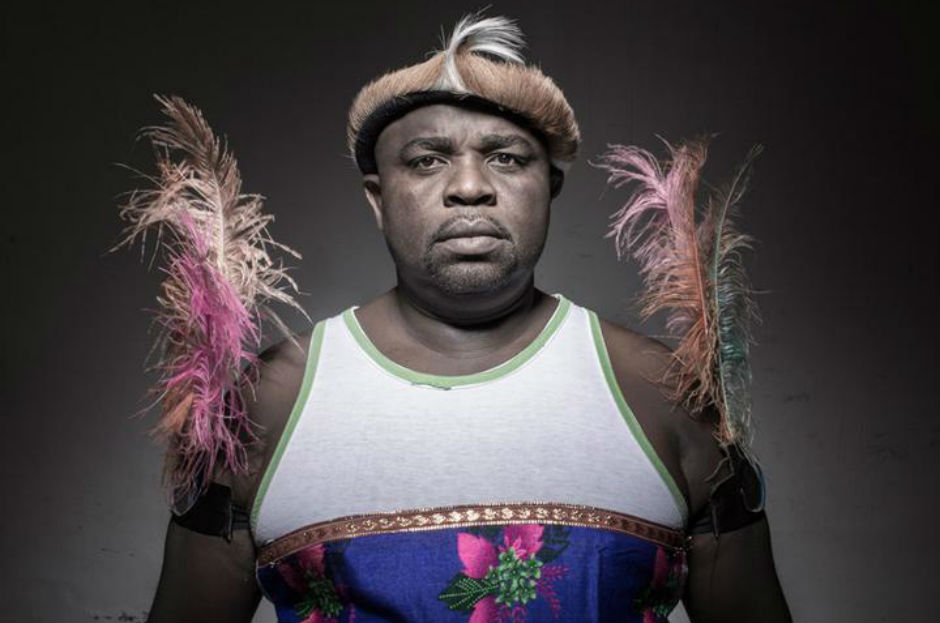When journalist and photographer Wills Glasspiegel discovered shangaan electro — a hyper-sped-up, synthesizer-ized interpretation of traditional African music forms like kwaito house and tsonga disco — it stimulated his sense of sight rather than his hearing. Tooling around YouTube with his friend Tshepang Rmoba from South African jazz-inflected band BLK JKS, he found videos featuring “women dancing in long billowing skirts laced with iridescent fabrics and neon plastic beads. The dance matches the skirts. They accentuate each other,” he recalls. Another, by shangaan peers the Tshetsha Boys, was a little stranger, with dancers decked out in “neon boiler-room suits in Afro wigs, skeleton masks, stuffed pregnant bellies, and of course the whole thing was propelled by a hyper, jubilant, ice-cream-truck-sounding dance music that fully captivated me.”
That’s the idea, says Nozinja, one of the pioneers of the genre whose pinwheeling new album, Nozinja Lodge, is out now (on forward-thinking, electronic-minded label Warp). “The dancers make me who I am,” he told SPIN one May afternoon, in the basement of the Red Bull Studios in Manhattan. “If they go fast, I go fast, so they control me. It’s that thing where you just go with the flow.”
A few hours after our talk, Nozinja (born Richard Mthetwa) will take the stage as the headliner for Electronic Africa, a showcase of artists from the continent and the opening night of Red Bull Music Academy‘s month-long festival of music. Following Johannesburg-based contemporary DJ Spoko‘s electrifying, self-described “Bacardi House” set, Nozinja foregrounded three dancers briskly gyrating their hips to splashy songs that, at 180 BPM, pulsate so fast and brightly that any lower-register bass is unnecessary. Pretty soon, it’s not just the dancers onstage that are guiding him: There’s a palpable heat in the air as everyone on the ground floor starts shaking and shimmying along. That night, the answer to Nozinja Lodge‘s chirping, jittery “Baby Do U Feel Me?” was a resounding “Yes.”
Nozinja’s shangaan electro, a ultra-fast collision of marimba blips and live guitars piped through keyboards, first came to larger light via 2010’s New Wave Dance Music From South Africa, a compilation released on U.K. world music label Honest Jon’s. It was music that had been recorded at his studio in Limpopo, South Africa, between 2006 and 2009, and which Glasspiegel stumbled upon in 2008. He found Mthetwa just as fortuitously after flying on a whim to South Africa for that exact purpose. “We wandered into a record shop in downtown Johannesburg, where we found a DVD that had same picture of these Tshetsha Boys wearing neon jump suits and wigs,” he says. “There was a phone number on the back of the DVD, so we called it up and got in touch with Nozinja, explaining that we saw his videos on YouTube. He said, ‘What are you talking about?'”
Mthetwa came to own the medium that initially puzzled him. Besides striking a deal with a South African telecommunications company (he formerly ran a cell phone repair store) to have access to the country’s elusive Internet to upload videos, his fascination with the video-streaming platform is reflected in the green-screen cover of New Wave, which embodies “the idea that these characters leapt out of YouTube into a new world,” says Glasspiegel. Through him, who helped Nozinja navigate royalty receipts from his videos they found out a homesick South African expat in Brooklyn had posted, his music reached the likes of footworkers DJ Rashad and DJ Spinn and Detroit tech-house legend Theo Parrish, who remixed some Nozinja tracks for the 2012 remix album Shangaan Shake.
Once Nozinja’s shangaan electro broke through to international ears, he appeared on the lineup at 2012’s Roskilde Festival; from there, it was only a matter of time before his music found its way to Warp, something Mthetwa attributes to his business mindset. “To travel is to gamble with your talent,” he says, referring to other South African musicians (who due to travel limitations of such a remote country, have a hard time breaking through internationally) as well as himself. “You must pay for flight to showcase your talent. You don’t know who’s going to be in the crowd! You might get promoters, record labels… Somebody in the crowd might not know which soundtrack to use in his upcoming movie, or they might say, ‘I can take this for my advert, I can do this for music games and whatever.'”
Nozinja Lodge, his (more) mainstream breakthrough, is a prime example. Rather than singing in his own voice, which he imitates as a throaty, tone-deaf growl, Nozinja recruited English-speaking singers for frothing album opener “Nwa Baloyi” and “Baby Do You Feel Me,” and the album hums along at a varied but still consistently frenetic style he wants to appeal to all audiences. “You’ve got slow jams, faster jams, dance songs,” he says. “You need to have variety in the album so everybody can associate and see themselves in the album.” “Mitshetshoi” and closer “Jaha,” for example, are practically ballads; the latter especially features a singer predominantly, his voice low and quavering against gently blooming synths and a considerably slowed-down rhythm.
With such a broad, sunny palette, says Nozinja, world domination can’t be far behind. “To play good music and be accepted, my dream will come true,” he says. “To go to Asia — Japan, China — and be nominated for Grammy Awards, maybe for international language music, and get one or two soundtracks in traditional music for African movies, that would be great.”





